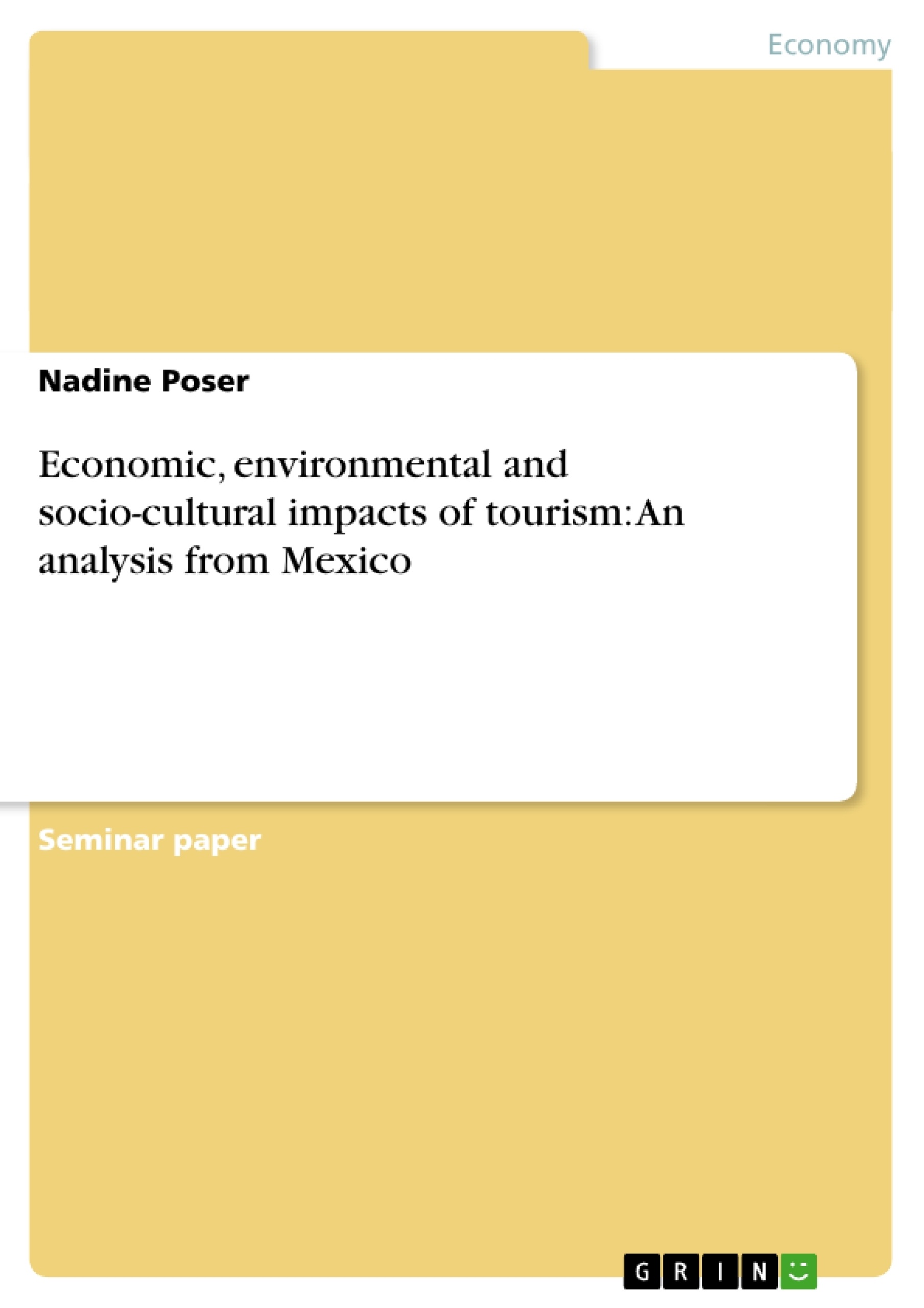Tourism industry has evolved to a leading economic factor for many countries.
According to the World Tourism Organization, tourists are people who "travel to and stay in
places outside their usual environment for not more than one consecutive year for leisure,
business and other purposes not related to the exercise of an activity remunerated from within the
place visited" (UNWTO, 2007). The agency examined that there were over 846 million
international tourist arrivals in 2006. The industry has become essential for many countries.
Tourism generates different kinds of revenue that can contribute to the host country’s welfare.
Further, with the development of resorts, jobs are created in sectors directly or indirectly related
to tourism such as transportation, accommodation and entertainment services.
The following report investigates economic, environmental and socio-cultural impacts in Mexico
caused by the tourism industry. Positive as well as negative influences will be investigated.
Furthermore, the paper will have a special focus on Cancún, a mega resort built by a
governmental agency within only a few years. Mexico accounts to the leading tourism
destinations among developing countries. Despite its wonderful beaches and the different kinds
of activities such as water sports, deep-sea fishing, diving Mexico offers a wide range of culture
and history. Ancient Maya sites, for example Tulum or Chichen Itza being the most popular
attraction with tourists.
Table of Contents
- Executive Summary
- Introduction
- Economic Impacts
- Environmental Impacts
- Socio-cultural Impacts
- Cancún: A Case Study
- Conclusion
Objectives and Key Themes
This report examines the economic, environmental, and socio-cultural impacts of the tourism industry in Mexico, with a particular focus on the resort city of Cancún. The report aims to provide an analysis of both the positive and negative influences of tourism on the country.
- Economic impacts of tourism in Mexico
- Environmental challenges posed by tourism development
- Socio-cultural changes resulting from tourism
- The specific case study of Cancún as a mega-resort
- The role of government policies and regulations in shaping the tourism industry
Chapter Summaries
- Executive Summary: Provides a brief overview of the report's key findings, highlighting the significance of tourism in Mexico and the need to analyze its multifaceted impacts.
- Introduction: Introduces Mexico as a tourist destination, highlighting its geographical location, demographics, and the significance of Cancún as a major tourism hub. The chapter also discusses the economic importance of tourism in Mexico.
- Economic Impacts: Explores the positive economic impacts of tourism in Mexico, focusing on revenue generation, employment creation, and contributions to GDP. The chapter also discusses the potential for leakage of revenue to international corporations and the challenges posed by corruption and lack of regulatory clarity.
- Environmental Impacts: Examines the environmental consequences of tourism development, including issues related to pollution, resource depletion, and habitat loss. The chapter discusses the need for sustainable tourism practices to mitigate these negative impacts.
- Socio-cultural Impacts: Analyzes the social and cultural changes brought about by tourism, focusing on topics like the commodification of culture, changes in traditional lifestyles, and the potential for cultural clashes. The chapter also explores the impact of tourism on local communities.
- Cancún: A Case Study: Presents an in-depth analysis of Cancún as a prime example of a mega-resort developed by the Mexican government. The chapter examines the economic benefits, environmental challenges, and socio-cultural implications associated with Cancún's growth.
Keywords
The report focuses on key concepts related to tourism in Mexico, including economic impacts, environmental sustainability, socio-cultural changes, mega-resorts, Cancún, government policies, and sustainable tourism practices.
- Quote paper
- Nadine Poser (Author), 2008, Economic, environmental and socio-cultural impacts of tourism: An analysis from Mexico, Munich, GRIN Verlag, https://www.grin.com/document/117568




